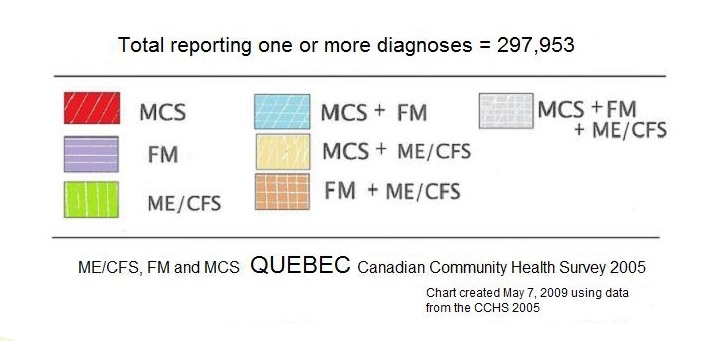Statistics
Canadian Statistics
Multiple Chemical Sensitivity (MCS)
Multiple Chemical Sensitivity (MCS), population 12 years and more, Québec
| Multiple Chemical Sensitivity (MCS) | Number, 2020 | %, 2020 | Number, 2016 | %, 2016 | Number, 2015 | %, 2015 |
|---|---|---|---|---|---|---|
| Québec | 251,000 | 3.4 | 230 500 | 3.2 | 173 500 | 2.5 |
| Canada | 1,130,800 | 3.5 | 1,008,400 | 3.3 | 940,500 | 3.1 |
Demographic characteristics of the MCS population in Quebec in 2020
Demographic characteristics of the MCS population in Canada, 2020
Over a million Canadians being diagnosed with MCS represents a large, unnecessary and avoidable tragedy, as well as a drain on society and the economy.
Frequency of Associated Diagnosis with Multiple Chemical Sensitivity (MCS)
Social and Economic Impact in Québec
The following information was extracted from the Statistics Canada datafile for the 2005 Canadian Community Health Survey.
An estimated 171,000 Quebecers have been diagnosed with MCS. Just over half were between the ages of 40 and 64, a quarter were younger than 40, and the remainder were 65 years old or older. 71% were female, and 29% were male.
In 2010, the number of diagnosed cases of MCS in Québec were 179,000. In Canada, there was a 34% increase between 2005 and 2010.
Quebecers with MCS showed a higher than normal degree of activity limitation:
| % of group reporting | Quebecers with MCS | Quebecers in General |
|---|---|---|
| Need help – preparing meals | 6% | 2% |
| Need help – getting to appointments and runnning errands | 12% | 4% |
| Need help – doing housework | 13% | 4% |
| Need help – heavy household chores (spring cleaning, yard work) | 26% | 10% |
| Need help – personal care | 3% | 1% |
| Need help – moving about inside the house | 3% | 1% |
Quebecers with MCS also experienced socio-economic disadvantage:
| % of group reporting | Quebecers with MCS | Quebecers in General |
|---|---|---|
| Permanently unable to work (ages 15-74) | 5% | 2% |
| Annual personal income less than $15,000 (ages 15+) | 34% | 30% |
| Food insecure | 6% | 5% |
| Very weak sense of belonging to local community | 13% | 13% |
There are gaps in service to Quebecers with MCS:
| % of group reporting | Quebecers with MCS | Quebecers in General |
|---|---|---|
| Unmet health care needs over the previous 12 months | 24% | 12% |
| Unmet health care needs over the previous 12 months (ages 18+) | 6% | 2% |
The Environmental Health Association of Québec has informed the Government of Québec that urgent help is required for recognition, support services and adequate health care for people suffering from MCS.
The above data, provided by the Government of Canada, proves us to be right.
MCS is a medical condition which has been recognized by the Canadian Human Rights Commission as a disability. This medical condition has a significant impact on the lives of MCS sufferers. Most people suffering from MCS fall through the cracks and do not have any support systems that they can depend on.
The Environmental Health Association of Quebec is a non-profit, registered charity working to support people suffering from MCS and to educate on ecological solutions for everyday living.
MCS frequently occurs with myalgic encephalomyelitis / chronic fatigue syndrome (ME/CFS) and fibromyalgia (FM)
- In 2005, 5% of Canadians (1.2 million people) have been diagnosed with at least one of these disorders.
- Of the 5% of Canadians diagnosed 2.4% reported MCS, 1.5% FM and 1.3% CFS.
- Among these individuals, at least 14% had two of the three conditions.
- Overall incidence rose with age from 1.6% at ages 12 to 24 to 6.9% at ages 45 to 64
Canadian community health survey 2005


